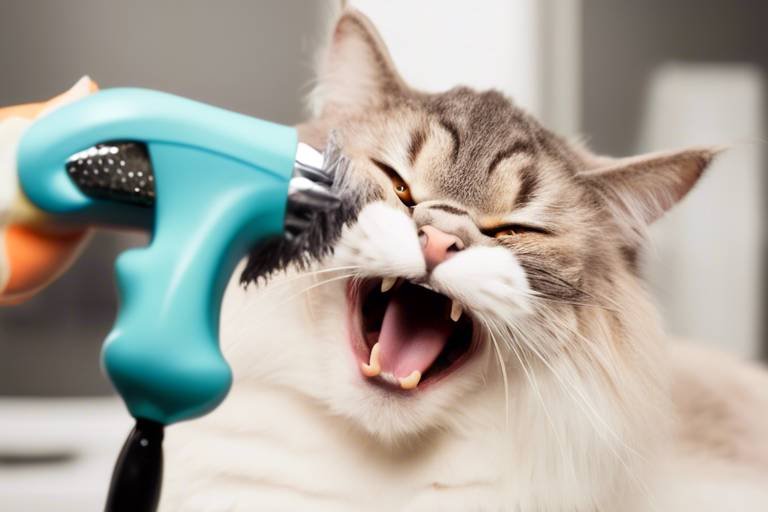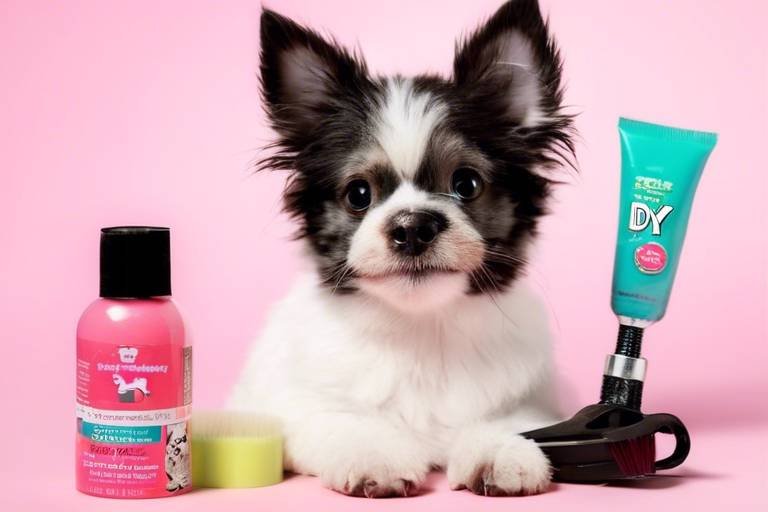How to Choose the Right Shampoo for Your Pet
Choosing the right shampoo for your beloved pet can feel like a daunting task. With so many options available, how do you ensure that you pick the best one for their unique needs? Well, fear not! This article will guide you through the essential factors to consider when selecting a shampoo for your pet, ensuring their coat remains healthy and clean. From understanding your pet's coat type to recognizing the importance of pH balance and consulting your veterinarian, we’ll cover everything you need to know. So, let’s dive in and make bath time a breeze for both you and your furry friend!
Just like humans, pets come in all shapes, sizes, and coat types. Whether your pet has a short, long, curly, or wiry coat, understanding their specific needs is crucial for choosing the right shampoo. For instance, short-haired breeds like Beagles may require a different formulation than long-haired breeds like Golden Retrievers. Long-haired pets often need shampoos that help detangle and moisturize, while short-haired pets may benefit from a product that focuses on removing dirt and excess oil. By identifying your pet's coat type, you can tailor your shampoo choice to keep their fur looking fabulous!
The ingredients in pet shampoos can significantly impact their effectiveness. It's essential to identify beneficial ingredients that promote a healthy coat while avoiding harmful chemicals that could irritate your pet's skin. Look for shampoos that contain natural ingredients like aloe vera, oatmeal, and coconut oil, as these can provide soothing effects and hydration. On the flip side, be wary of shampoos loaded with sulfates, parabens, and artificial fragrances, as these can lead to skin irritation and discomfort for your pet. When shopping for pet shampoo, always read the labels and choose wisely!
Choosing between natural and synthetic ingredients is a common dilemma for pet owners. Natural ingredients often provide gentle cleansing and nourishment, making them an excellent choice for pets with sensitive skin. For example, oatmeal is known for its soothing properties, while aloe vera can help hydrate and heal irritated skin. On the other hand, synthetic options may offer stronger results, particularly for deep cleaning or specific skin conditions. Understanding these differences can aid in your decision-making process, ensuring that your pet receives the best care possible.
Natural ingredients, such as aloe vera and oatmeal, can soothe the skin and provide nourishment. They are often safer for pets with sensitivities or allergies, making them a popular choice among pet owners. When you choose a shampoo with natural ingredients, you’re not just cleaning your pet’s coat; you’re also providing them with a gentle, nurturing experience. Think of it as treating your pet to a spa day rather than just a bath!
While some synthetic ingredients can be effective, certain chemicals can cause skin irritation or allergic reactions in pets. Ingredients like sulfates and artificial fragrances can strip away natural oils, leading to dryness and discomfort. Awareness of these risks is vital for ensuring your pet’s safety and comfort during grooming. Always opt for products that prioritize your pet's health and well-being over flashy marketing claims.
Certain ingredients are known allergens for pets, and avoiding them is crucial. Familiarizing yourself with common allergens can prevent adverse reactions and ensure a pleasant bathing experience for your furry friend. Some common allergens to watch out for include:
- Fragrance (artificial)
- Parabens
- Sulfates
- Alcohol
By steering clear of these ingredients, you can help keep your pet's skin healthy and irritation-free.
Pets have a different skin pH compared to humans, making it essential to choose shampoos formulated specifically for their needs. Selecting the right pH level helps maintain their skin's natural balance. A shampoo with a pH level that's too high or too low can lead to irritation, dryness, or infections. When shopping for pet shampoo, look for products that are specifically labeled as pH-balanced for pets to ensure you’re making the right choice.
Maintaining the correct pH balance is vital for your pet's skin health. An imbalanced pH can lead to irritation, dryness, or infections, highlighting the importance of proper shampoo selection. Think of it this way: just as you wouldn’t use harsh chemicals on your skin, your pet deserves the same gentle care. By choosing a shampoo that respects their unique skin chemistry, you’re investing in their long-term health and happiness.
Testing the pH of a shampoo can be done using simple kits available at pet stores. These kits are easy to use and can provide you with valuable information about the products you’re considering. Understanding how to measure pH levels will empower you to make informed choices for your pet’s grooming needs. It’s a small step that can make a big difference in your pet’s comfort and skin health.
When in doubt, consulting your veterinarian can provide personalized recommendations based on your pet’s specific needs. They can help identify the best shampoo for any underlying skin conditions or sensitivities. Your veterinarian is your partner in ensuring your pet’s health, so don’t hesitate to reach out if you have questions or concerns about grooming products.
If your pet shows signs of skin issues or allergies, seeking professional advice is crucial. A veterinarian can recommend appropriate products tailored to your pet's unique situation. Remember, just like us, pets can have specific needs, and a one-size-fits-all approach may not always work. By working together with your vet, you can find the perfect grooming solution for your furry companion.
Incorporating regular grooming practices alongside the right shampoo can enhance your pet's coat health. Establishing a routine will help maintain cleanliness and prevent matting or skin problems. Regular brushing, combined with the right shampoo, can keep your pet looking and feeling their best. Plus, it’s a great way to bond with your furry friend while ensuring they stay clean and comfortable.
Q1: How often should I bathe my pet?
A: It depends on the breed and coat type. Generally, dogs can be bathed every 4-6 weeks, while cats may require less frequent baths.
Q2: Can I use human shampoo on my pet?
A: No, human shampoos are formulated for different pH levels and can irritate your pet's skin. Always use a shampoo specifically designed for pets.
Q3: What should I do if my pet has a skin reaction after using a shampoo?
A: Discontinue use immediately and consult your veterinarian for advice on how to treat the reaction and find a suitable alternative.
Q4: Are there shampoos for pets with allergies?
A: Yes, there are hypoallergenic shampoos designed specifically for pets with sensitivities or allergies. Consult your vet for recommendations.
Q5: How can I tell if a shampoo is safe for my pet?
A: Look for products labeled as pet-safe, check the ingredient list for harmful substances, and consult your veterinarian if unsure.

Understanding Your Pet's Coat Type
This article will guide you through the essential factors to consider when selecting a shampoo for your pet, ensuring their coat remains healthy and clean.
When it comes to choosing the right shampoo for your furry friend, understanding their coat type is like knowing the secret ingredient in your favorite recipe. Just as you wouldn't use the same shampoo for a silky-haired Persian cat as you would for a wiry-haired terrier, recognizing the unique characteristics of your pet's coat is crucial. Different pets have varying coat types that require specific shampoo formulations. For instance, short-haired pets often have a different texture and oil balance compared to long-haired pets, and this can affect how well a shampoo cleans and conditions their coat.
Let’s break down the main coat types:
- Short Coats: These coats are generally easier to maintain and require shampoos that focus on cleansing and removing dirt without stripping natural oils.
- Long Coats: Long-haired pets need shampoos that provide extra moisture and detangling properties to prevent matting and maintain shine.
- Curly Coats: Breeds like Poodles benefit from shampoos that enhance curl definition and hydration to keep their coat looking its best.
- Wiry Coats: These coats often require special formulations to help maintain their unique texture while ensuring cleanliness.
Understanding your pet's coat type is not just about aesthetics; it's about their overall health and comfort. For example, using a shampoo meant for short-haired dogs on a long-haired breed can lead to dryness and irritation, making bath time a less pleasant experience for both you and your pet. Additionally, some pets may have a double coat, which requires specific care to prevent matting and promote a healthy undercoat. It's essential to choose a shampoo that caters to these specific needs, ensuring that your pet's coat remains lustrous and healthy.
Moreover, the environment in which your pet lives can also influence their coat health. Pets that spend a lot of time outdoors may accumulate more dirt and debris, necessitating a more robust cleaning formula. On the other hand, indoor pets might require gentler shampoos that focus more on maintaining skin health rather than heavy-duty cleansing. So, as you stand in the pet aisle, remember that the right shampoo is not a one-size-fits-all solution; it's about finding the perfect match for your pet’s unique coat type and lifestyle.
The ingredients in pet shampoos can significantly impact their effectiveness. It's essential to identify beneficial ingredients that promote a healthy coat while avoiding harmful chemicals that could irritate your pet's skin.
Choosing between natural and synthetic ingredients is a common dilemma. Natural ingredients often provide gentle cleansing, while synthetic options may offer stronger results. Understanding these differences can aid in your decision-making.
Natural ingredients, such as aloe vera and oatmeal, can soothe the skin and provide nourishment. They are often safer for pets with sensitivities or allergies, making them a popular choice among pet owners.
Some synthetic ingredients can cause skin irritation or allergic reactions in pets. Awareness of these risks is vital for ensuring your pet’s safety and comfort during grooming.
Certain ingredients are known allergens for pets, and avoiding them is crucial. Familiarizing yourself with common allergens can prevent adverse reactions and ensure a pleasant bathing experience for your furry friend.
Pets have a different skin pH compared to humans, making it essential to choose shampoos formulated specifically for their needs. Selecting the right pH level helps maintain their skin's natural balance.
Maintaining the correct pH balance is vital for your pet's skin health. An imbalanced pH can lead to irritation, dryness, or infections, highlighting the importance of proper shampoo selection.
Testing the pH of a shampoo can be done using simple kits available at pet stores. Understanding how to measure pH levels will empower you to make informed choices for your pet’s grooming needs.
When in doubt, consulting your veterinarian can provide personalized recommendations based on your pet’s specific needs. They can help identify the best shampoo for any underlying skin conditions or sensitivities.
If your pet shows signs of skin issues or allergies, seeking professional advice is crucial. A veterinarian can recommend appropriate products tailored to your pet's unique situation.
Incorporating regular grooming practices alongside the right shampoo can enhance your pet's coat health. Establishing a routine will help maintain cleanliness and prevent matting or skin problems.
Q: How often should I bathe my pet?
A: It depends on your pet's coat type and lifestyle. Generally, bathing every 4-6 weeks is sufficient, but some may require more frequent baths.
Q: Can I use human shampoo on my pet?
A: No, human shampoos are formulated for different pH levels and can irritate your pet's skin. Always use pet-specific shampoos.
Q: What should I do if my pet has a reaction to shampoo?
A: Discontinue use immediately and consult your veterinarian for advice on suitable alternatives.

Ingredients to Look For
When it comes to selecting the right shampoo for your beloved pet, one of the most critical aspects to consider is the ingredients. The right blend can make all the difference in maintaining a healthy and shiny coat. So, what should you be looking for? First, it's essential to recognize that not all shampoos are created equal. Some may contain harsh chemicals that could irritate your pet's skin, while others are packed with beneficial ingredients that promote skin health. It's like choosing between a nutritious meal and fast food—one is good for you, while the other might lead to problems down the line.
Here are some key ingredients you should look for:
- Aloe Vera: Known for its soothing properties, aloe vera can help calm irritated skin and provide moisture.
- Oatmeal: This ingredient is excellent for pets with sensitive skin, as it can relieve itching and inflammation.
- Coconut Oil: A natural moisturizer that not only hydrates the skin but also adds shine to the coat.
- Tea Tree Oil: With its antibacterial and antifungal properties, tea tree oil can help combat skin infections, but it should always be used in diluted form.
In contrast, it’s also crucial to avoid certain harmful ingredients that could cause more harm than good. For instance, sulfates, parabens, and artificial fragrances can lead to skin irritations and allergic reactions. Just like how you wouldn't want to put harsh chemicals on your own skin, the same principle applies to your furry friend. Think of your pet's skin as a delicate fabric; you wouldn't wash silk with a harsh detergent, right?
To make informed decisions, you might want to check the ingredient list on the shampoo bottle. A good rule of thumb is to choose products with natural ingredients as much as possible. Natural ingredients tend to be gentler and less likely to cause adverse reactions. Plus, they often come with additional benefits, such as promoting a healthy coat and skin. It's a win-win!
Lastly, remember that every pet is unique, and what works for one might not work for another. It's always wise to do a patch test with any new shampoo. Apply a small amount to a patch of your pet's skin and observe for any reactions over 24 hours. This simple step can save you from a world of trouble and ensure your furry friend enjoys their bath time!
Natural vs. Synthetic Ingredients
This article will guide you through the essential factors to consider when selecting a shampoo for your pet, ensuring their coat remains healthy and clean.
Different pets have varying coat types that require specific shampoo formulations. Understanding whether your pet has a short, long, curly, or wiry coat is crucial for choosing the right product.
The ingredients in pet shampoos can significantly impact their effectiveness. It's essential to identify beneficial ingredients that promote a healthy coat while avoiding harmful chemicals that could irritate your pet's skin.
When it comes to selecting the right shampoo for your furry friend, the debate between natural and synthetic ingredients often arises. Each type has its own set of advantages and drawbacks that can influence your decision. Natural ingredients are derived from plants, minerals, and other organic sources, making them a popular choice for pet owners who prioritize gentle and environmentally friendly grooming options. For instance, ingredients like aloe vera and oatmeal are known for their soothing properties, providing nourishment while minimizing the risk of irritation.
On the other hand, synthetic ingredients can offer stronger cleaning power and may contain specialized compounds designed to target specific issues like dandruff or excessive oiliness. However, these synthetic options can sometimes lead to skin irritation or allergic reactions in sensitive pets. It's essential to weigh the benefits of each type:
- Natural Ingredients: Generally safer, ideal for pets with allergies, and often provide soothing effects.
- Synthetic Ingredients: May be more effective for specific problems but could irritate sensitive skin.
Ultimately, the choice between natural and synthetic ingredients should depend on your pet's unique needs and any sensitivities they may have. It’s worth noting that some pet shampoos combine both natural and synthetic elements to strike a balance between effectiveness and gentleness.
Natural ingredients, such as aloe vera and oatmeal, can soothe the skin and provide nourishment. They are often safer for pets with sensitivities or allergies, making them a popular choice among pet owners.
Some synthetic ingredients can cause skin irritation or allergic reactions in pets. Awareness of these risks is vital for ensuring your pet’s safety and comfort during grooming.
Certain ingredients are known allergens for pets, and avoiding them is crucial. Familiarizing yourself with common allergens can prevent adverse reactions and ensure a pleasant bathing experience for your furry friend.
Pets have a different skin pH compared to humans, making it essential to choose shampoos formulated specifically for their needs. Selecting the right pH level helps maintain their skin's natural balance.
Maintaining the correct pH balance is vital for your pet's skin health. An imbalanced pH can lead to irritation, dryness, or infections, highlighting the importance of proper shampoo selection.
Testing the pH of a shampoo can be done using simple kits available at pet stores. Understanding how to measure pH levels will empower you to make informed choices for your pet’s grooming needs.
When in doubt, consulting your veterinarian can provide personalized recommendations based on your pet’s specific needs. They can help identify the best shampoo for any underlying skin conditions or sensitivities.
If your pet shows signs of skin issues or allergies, seeking professional advice is crucial. A veterinarian can recommend appropriate products tailored to your pet's unique situation.
Incorporating regular grooming practices alongside the right shampoo can enhance your pet's coat health. Establishing a routine will help maintain cleanliness and prevent matting or skin problems.
It depends on your pet's breed and lifestyle. Generally, dogs can be bathed every 4-6 weeks, while cats may require less frequent bathing. Always consult your veterinarian for specific recommendations.
No, human shampoos are formulated for human skin, which has a different pH than that of pets. Always use shampoos specifically designed for your pet's needs.
If your pet shows signs of irritation or an allergic reaction, stop using the product immediately and consult your veterinarian for advice on alternative shampoos.
Benefits of Natural Ingredients
This article will guide you through the essential factors to consider when selecting a shampoo for your pet, ensuring their coat remains healthy and clean.
Different pets have varying coat types that require specific shampoo formulations. Understanding whether your pet has a short, long, curly, or wiry coat is crucial for choosing the right product.
The ingredients in pet shampoos can significantly impact their effectiveness. It's essential to identify beneficial ingredients that promote a healthy coat while avoiding harmful chemicals that could irritate your pet's skin.
Choosing between natural and synthetic ingredients is a common dilemma. Natural ingredients often provide gentle cleansing, while synthetic options may offer stronger results. Understanding these differences can aid in your decision-making.
When it comes to keeping your furry friend's coat healthy, natural ingredients can be a game changer. They offer a range of benefits that not only enhance the cleanliness of your pet's fur but also contribute to their overall well-being. For instance, ingredients like aloe vera and oatmeal are renowned for their soothing properties. Aloe vera is particularly effective at calming irritated skin and providing hydration, while oatmeal serves as a natural exfoliant that helps remove dead skin cells.
In addition to their soothing effects, natural ingredients are often safer for pets with sensitivities or allergies. Many pet owners have noticed that switching to shampoos with natural components has led to fewer allergic reactions and skin irritations. Here are some key benefits of using natural ingredients:
- Gentle on the Skin: Natural shampoos are less likely to contain harsh chemicals that can strip your pet's skin of its natural oils.
- Environmentally Friendly: Most natural ingredients are biodegradable and less harmful to the environment.
- Rich in Nutrients: Natural ingredients are often packed with vitamins and minerals that nourish the skin and coat.
Furthermore, many natural shampoos are free from artificial fragrances and colors, which can be irritating to your pet. Instead, they often incorporate essential oils that provide a pleasant scent without the harmful side effects. For example, lavender oil not only smells delightful but also has calming properties that can help soothe anxious pets during bath time.
Ultimately, choosing a shampoo with natural ingredients can enhance your pet's bathing experience while promoting a shiny, healthy coat. It's like treating your pet to a spa day every time they get a bath!
Some synthetic ingredients can cause skin irritation or allergic reactions in pets. Awareness of these risks is vital for ensuring your pet’s safety and comfort during grooming.
Certain ingredients are known allergens for pets, and avoiding them is crucial. Familiarizing yourself with common allergens can prevent adverse reactions and ensure a pleasant bathing experience for your furry friend.
Pets have a different skin pH compared to humans, making it essential to choose shampoos formulated specifically for their needs. Selecting the right pH level helps maintain their skin's natural balance.
Maintaining the correct pH balance is vital for your pet's skin health. An imbalanced pH can lead to irritation, dryness, or infections, highlighting the importance of proper shampoo selection.
Testing the pH of a shampoo can be done using simple kits available at pet stores. Understanding how to measure pH levels will empower you to make informed choices for your pet’s grooming needs.
When in doubt, consulting your veterinarian can provide personalized recommendations based on your pet’s specific needs. They can help identify the best shampoo for any underlying skin conditions or sensitivities.
If your pet shows signs of skin issues or allergies, seeking professional advice is crucial. A veterinarian can recommend appropriate products tailored to your pet's unique situation.
Incorporating regular grooming practices alongside the right shampoo can enhance your pet's coat health. Establishing a routine will help maintain cleanliness and prevent matting or skin problems.
Q1: How often should I bathe my pet?
A: It depends on your pet's coat type and lifestyle. Generally, once a month is sufficient for most pets, but active or outdoor pets may need more frequent baths.
Q2: Can I use human shampoo on my pet?
A: No, human shampoos are formulated for different pH levels and can irritate your pet's skin. Always use shampoos specifically designed for pets.
Q3: What should I do if my pet has a reaction to shampoo?
A: If your pet shows signs of irritation, rinse them off immediately and consult your veterinarian for advice on alternative products.
Risks of Synthetic Ingredients
This article will guide you through the essential factors to consider when selecting a shampoo for your pet, ensuring their coat remains healthy and clean.
Different pets have varying coat types that require specific shampoo formulations. Understanding whether your pet has a short, long, curly, or wiry coat is crucial for choosing the right product.
The ingredients in pet shampoos can significantly impact their effectiveness. It's essential to identify beneficial ingredients that promote a healthy coat while avoiding harmful chemicals that could irritate your pet's skin.
Choosing between natural and synthetic ingredients is a common dilemma. Natural ingredients often provide gentle cleansing, while synthetic options may offer stronger results. Understanding these differences can aid in your decision-making.
Natural ingredients, such as aloe vera and oatmeal, can soothe the skin and provide nourishment. They are often safer for pets with sensitivities or allergies, making them a popular choice among pet owners.
While synthetic ingredients can sometimes deliver impressive results, they come with their own set of risks that every pet owner should be aware of. Many synthetic shampoos contain harsh chemicals that can lead to skin irritation, allergic reactions, or even more severe health issues in pets. For instance, ingredients like sulfates and parabens, commonly found in human shampoos, can strip away natural oils from your pet's skin, leading to dryness and discomfort.
Moreover, some synthetic fragrances and dyes may cause allergic reactions in sensitive pets. These reactions can manifest as redness, itching, or even more severe skin conditions. It's essential to read labels carefully and be aware of the following common synthetic ingredients that could pose a risk:
- Sulfates: Often used for their cleansing properties, they can be too harsh for your pet's delicate skin.
- Parabens: Preservatives that may disrupt hormonal balance and cause skin irritation.
- Artificial Fragrances: Can cause allergic reactions and are often made from unknown chemicals.
In conclusion, while synthetic shampoos may seem appealing for their quick results, the potential risks they pose to your pet's health should not be overlooked. Always opt for products that prioritize safety and are specifically formulated for your pet's unique needs.
Pets have a different skin pH compared to humans, making it essential to choose shampoos formulated specifically for their needs. Selecting the right pH level helps maintain their skin's natural balance.
Maintaining the correct pH balance is vital for your pet's skin health. An imbalanced pH can lead to irritation, dryness, or infections, highlighting the importance of proper shampoo selection.
Testing the pH of a shampoo can be done using simple kits available at pet stores. Understanding how to measure pH levels will empower you to make informed choices for your pet’s grooming needs.
When in doubt, consulting your veterinarian can provide personalized recommendations based on your pet’s specific needs. They can help identify the best shampoo for any underlying skin conditions or sensitivities.
If your pet shows signs of skin issues or allergies, seeking professional advice is crucial. A veterinarian can recommend appropriate products tailored to your pet's unique situation.
Incorporating regular grooming practices alongside the right shampoo can enhance your pet's coat health. Establishing a routine will help maintain cleanliness and prevent matting or skin problems.
- How often should I bathe my pet? It depends on the breed and coat type, but generally, once a month is sufficient for most pets.
- Can I use human shampoo on my pet? No, human shampoos are not formulated for pets and can disrupt their skin's pH balance.
- What should I do if my pet has a reaction to shampoo? Immediately rinse off the shampoo and consult your veterinarian for further advice.
Common Allergens to Avoid
This article will guide you through the essential factors to consider when selecting a shampoo for your pet, ensuring their coat remains healthy and clean.
Different pets have varying coat types that require specific shampoo formulations. Understanding whether your pet has a short, long, curly, or wiry coat is crucial for choosing the right product.
The ingredients in pet shampoos can significantly impact their effectiveness. It's essential to identify beneficial ingredients that promote a healthy coat while avoiding harmful chemicals that could irritate your pet's skin.
Choosing between natural and synthetic ingredients is a common dilemma. Natural ingredients often provide gentle cleansing, while synthetic options may offer stronger results. Understanding these differences can aid in your decision-making.
Natural ingredients, such as aloe vera and oatmeal, can soothe the skin and provide nourishment. They are often safer for pets with sensitivities or allergies, making them a popular choice among pet owners.
Some synthetic ingredients can cause skin irritation or allergic reactions in pets. Awareness of these risks is vital for ensuring your pet’s safety and comfort during grooming.
When selecting a shampoo for your furry friend, it's crucial to be aware of common allergens that can cause adverse reactions. Pets, like humans, can have sensitivities to certain ingredients, and knowing which ones to avoid can make all the difference in their bathing experience. Here are some of the most notorious culprits:
- Fragrances: Many shampoos contain artificial scents that can irritate sensitive skin. Opting for fragrance-free options is often a safer choice.
- Parabens: These preservatives are commonly found in personal care products but can lead to skin irritation in pets.
- Sulfates: While they effectively remove dirt and oils, sulfates can strip natural oils from your pet's skin, leading to dryness and irritation.
- Alcohol: This ingredient can be very drying and may exacerbate skin problems, so it's best to avoid shampoos that list alcohol among their ingredients.
- Colorants: Artificial colorants serve no purpose other than aesthetics and can be harmful to pets with sensitive skin.
By steering clear of these common allergens, you can help ensure a pleasant and safe bathing experience for your pet. Always read the labels carefully, and when in doubt, consult your veterinarian for recommendations tailored to your pet's unique needs.
Pets have a different skin pH compared to humans, making it essential to choose shampoos formulated specifically for their needs. Selecting the right pH level helps maintain their skin's natural balance.
Maintaining the correct pH balance is vital for your pet's skin health. An imbalanced pH can lead to irritation, dryness, or infections, highlighting the importance of proper shampoo selection.
Testing the pH of a shampoo can be done using simple kits available at pet stores. Understanding how to measure pH levels will empower you to make informed choices for your pet’s grooming needs.
When in doubt, consulting your veterinarian can provide personalized recommendations based on your pet’s specific needs. They can help identify the best shampoo for any underlying skin conditions or sensitivities.
If your pet shows signs of skin issues or allergies, seeking professional advice is crucial. A veterinarian can recommend appropriate products tailored to your pet's unique situation.
Incorporating regular grooming practices alongside the right shampoo can enhance your pet's coat health. Establishing a routine will help maintain cleanliness and prevent matting or skin problems.
- How often should I bathe my pet? - It depends on the breed and coat type. Generally, once a month is sufficient for most pets.
- Can I use human shampoo on my pet? - No, human shampoos have different pH levels and can irritate your pet's skin.
- What signs indicate my pet might be allergic to their shampoo? - Look for excessive scratching, redness, or rashes after bathing.

Choosing the Right pH Level
When it comes to your furry friend’s grooming routine, one of the most overlooked aspects is the pH level of the shampoo you choose. Did you know that pets have a different skin pH compared to humans? That's right! While our skin typically has a pH of around 5.5, most pets have a pH level ranging from 6 to 7. This difference is crucial because selecting a shampoo with the right pH can significantly impact your pet's skin health and overall comfort.
Using a shampoo with an incorrect pH level can lead to a host of issues. For instance, if the shampoo is too acidic or alkaline, it can disrupt your pet's natural skin barrier, leading to irritation, dryness, and even infections. Imagine wearing a shirt that’s either too tight or too loose; it just doesn’t feel right, right? The same goes for your pet's skin. Thus, ensuring that the shampoo is formulated specifically for pets is essential to maintain their skin's natural balance.
But how do you know if a shampoo has the right pH? Many reputable brands will indicate the pH level on their packaging. However, if you're ever in doubt, you can easily test the pH of a shampoo at home. There are simple pH testing kits available at pet stores or online that can help you measure the pH level of your chosen shampoo. Just like checking the temperature of your bath water, you want to ensure it’s just right for your pet!
Here’s a quick rundown of the importance of pH balance:
- Maintains Skin Health: A balanced pH helps protect your pet's skin from harmful bacteria and allergens.
- Prevents Irritation: Using the wrong pH can cause discomfort, itching, and redness.
- Supports Natural Oils: Proper pH levels help maintain the natural oils in your pet's coat, keeping it healthy and shiny.
In conclusion, selecting a shampoo with the right pH level is not just a matter of preference; it’s a necessity for keeping your pet happy and healthy. So the next time you’re out shopping for pet shampoo, take a moment to check the pH level and ensure it aligns with your pet’s needs. Your furry friend will thank you for it!
Q: What is the ideal pH level for pet shampoos?
A: The ideal pH level for pet shampoos should be between 6 and 7, which is suitable for most pets.
Q: Can I use human shampoo on my pet?
A: It is not recommended to use human shampoo on pets, as it may have an inappropriate pH level and could irritate their skin.
Q: How often should I bathe my pet with the right shampoo?
A: Generally, bathing your pet once a month is sufficient, but this can vary based on their activity level and coat type.
Q: What should I do if my pet has a reaction to shampoo?
A: If your pet shows signs of irritation or an allergic reaction, discontinue use immediately and consult your veterinarian for advice.
Importance of pH Balance
This article will guide you through the essential factors to consider when selecting a shampoo for your pet, ensuring their coat remains healthy and clean.
Different pets have varying coat types that require specific shampoo formulations. Understanding whether your pet has a short, long, curly, or wiry coat is crucial for choosing the right product.
The ingredients in pet shampoos can significantly impact their effectiveness. It's essential to identify beneficial ingredients that promote a healthy coat while avoiding harmful chemicals that could irritate your pet's skin.
Choosing between natural and synthetic ingredients is a common dilemma. Natural ingredients often provide gentle cleansing, while synthetic options may offer stronger results. Understanding these differences can aid in your decision-making.
Natural ingredients, such as aloe vera and oatmeal, can soothe the skin and provide nourishment. They are often safer for pets with sensitivities or allergies, making them a popular choice among pet owners.
Some synthetic ingredients can cause skin irritation or allergic reactions in pets. Awareness of these risks is vital for ensuring your pet’s safety and comfort during grooming.
Certain ingredients are known allergens for pets, and avoiding them is crucial. Familiarizing yourself with common allergens can prevent adverse reactions and ensure a pleasant bathing experience for your furry friend.
Pets have a different skin pH compared to humans, making it essential to choose shampoos formulated specifically for their needs. Selecting the right pH level helps maintain their skin's natural balance.
Maintaining the correct pH balance is vital for your pet's skin health. Just like humans, pets need a specific range of acidity or alkalinity to keep their skin functioning optimally. If the pH level is off, it can lead to a range of issues, including:
- Irritation: An imbalanced pH can cause discomfort and lead to scratching or biting at the skin.
- Dryness: A high pH can strip away natural oils, resulting in dry, flaky skin.
- Infections: An improper pH level can create an environment conducive to bacterial or fungal infections.
To put it simply, think of your pet's skin like a delicate ecosystem. Just as a fish tank requires the right balance of pH for the fish to thrive, your pet's skin needs the right shampoo to maintain its health. Regularly using a shampoo with the correct pH can help:
- Preserve the skin barrier, keeping it protected from environmental irritants.
- Support the growth of healthy fur by promoting a nourished skin environment.
- Reduce the likelihood of skin-related issues, ensuring your pet stays comfortable and happy.
So, how do you choose the right pH-balanced shampoo? Look for products specifically labeled for pets, as they are formulated to meet their unique needs. Additionally, testing the pH of the shampoo can be done using simple kits available at pet stores. Understanding how to measure pH levels will empower you to make informed choices for your pet’s grooming needs.
When in doubt, consulting your veterinarian can provide personalized recommendations based on your pet’s specific needs. They can help identify the best shampoo for any underlying skin conditions or sensitivities.
If your pet shows signs of skin issues or allergies, seeking professional advice is crucial. A veterinarian can recommend appropriate products tailored to your pet's unique situation.
Incorporating regular grooming practices alongside the right shampoo can enhance your pet's coat health. Establishing a routine will help maintain cleanliness and prevent matting or skin problems.
It depends on your pet's coat type and lifestyle. Generally, a bath every 4-6 weeks is sufficient for most pets.
No, human shampoos are formulated for human skin pH, which can irritate your pet's skin. Always use pet-specific products.
If you notice any signs of irritation or allergic reactions, discontinue use immediately and consult your veterinarian.
Natural shampoos can be gentler and safer for pets, especially those with sensitivities. However, always check the ingredient list.
How to Test pH Levels
Testing the pH levels of your pet's shampoo is a straightforward process that can significantly impact your furry friend's skin health. The pH scale ranges from 0 to 14, with values below 7 indicating acidity, 7 being neutral, and above 7 indicating alkalinity. Most pets require a shampoo with a pH level between 6 and 7.5 to maintain their skin's natural balance. An unbalanced pH can lead to skin irritation, dryness, or even infections, making it crucial to choose the right product.
To test the pH levels of your chosen shampoo, you can use simple pH test strips, which are widely available at pet stores or online. Here’s a quick guide on how to conduct the test:
- Gather Your Materials: You will need pH test strips, a small container, and a sample of the shampoo.
- Prepare the Sample: Take a small amount of the shampoo and mix it with an equal part of distilled water in the container. This dilution helps achieve a more accurate reading.
- Dip the Test Strip: Immerse a pH test strip into the diluted shampoo mixture for a few seconds.
- Compare the Color: Remove the strip and wait for the recommended time. Then, compare the strip’s color to the pH scale provided with the test strips to determine the pH level.
Understanding how to measure pH levels empowers you to make informed decisions for your pet’s grooming needs. If you find that the shampoo's pH is not within the recommended range, it might be best to look for alternative products. Remember, a little effort can go a long way in ensuring your pet's skin remains healthy and irritation-free!
Q1: Why is pH balance important for my pet's skin?
Maintaining the correct pH balance is crucial as it helps to protect your pet's skin from irritation and infections. An imbalanced pH can lead to dryness, itching, and other skin issues.
Q2: Can I use human shampoo on my pet?
No, human shampoos are formulated for a different pH level than that of pets. Using them can disrupt your pet's skin balance, leading to irritation and dryness.
Q3: How often should I bathe my pet?
The frequency of bathing depends on your pet's coat type and lifestyle. Generally, bathing every 4 to 6 weeks is sufficient, but consult your veterinarian for personalized advice.
Q4: What should I do if my pet has a reaction to shampoo?
If your pet shows signs of irritation, such as excessive scratching or redness, discontinue use immediately and consult your veterinarian for guidance.

Consulting Your Veterinarian
When it comes to the well-being of your furry friend, there’s no one better to consult than your veterinarian. They are like the superheroes of pet care, equipped with knowledge that can help you navigate the sometimes overwhelming world of pet grooming products. If you're ever in doubt about which shampoo to choose, your vet can provide personalized recommendations tailored to your pet’s unique needs. Whether your pet has a specific skin condition, allergies, or just a particular coat type, your vet can guide you through the options available.
It’s essential to recognize that not all pets are the same. Just like humans, pets can have individual sensitivities and requirements. For instance, if your pet has been experiencing itching, redness, or any unusual skin reactions, it’s crucial to seek professional advice. Your veterinarian can help identify the underlying cause of these symptoms and recommend shampoos that are best suited for treatment. They might even suggest medicated shampoos that are formulated to tackle specific issues, such as dermatitis or fungal infections.
Moreover, your veterinarian can help you understand the importance of regular grooming practices in conjunction with the right shampoo. They can provide tips on how often you should bathe your pet, depending on their coat type and lifestyle. For example, a dog that loves to roll in the mud may need more frequent baths than a cat that primarily stays indoors. Establishing a grooming routine is vital for maintaining your pet's coat health and preventing issues like matting or skin infections.
To help you make the most of your vet consultations, consider preparing a list of questions beforehand. This can ensure that you cover all your concerns during the appointment. Here are a few examples of questions you might want to ask:
- What type of shampoo do you recommend for my pet’s specific coat type?
- Are there any ingredients I should avoid due to my pet’s allergies?
- How often should I bathe my pet?
- Can you recommend any specific brands or products?
In summary, consulting your veterinarian can be a game-changer when it comes to selecting the right shampoo for your pet. Their expertise can help you make informed decisions that promote not only a clean coat but also overall skin health. So, don’t hesitate to reach out to them whenever you're uncertain about grooming products or if your pet exhibits any concerning symptoms. A little professional guidance can go a long way in keeping your furry friend happy and healthy!
Here are some common questions pet owners often ask when it comes to choosing the right shampoo:
- How often should I bathe my pet? It varies by pet type and activity level. Consult your vet for personalized advice.
- Can I use human shampoo on my pet? No, human shampoos can disrupt your pet's skin pH balance and cause irritation.
- What should I do if my pet has an allergic reaction to a shampoo? Immediately rinse the shampoo off and consult your veterinarian for further guidance.
- Are there any specific brands you recommend? Your vet can provide recommendations based on your pet's needs and any existing conditions.
When to Seek Professional Advice
This article will guide you through the essential factors to consider when selecting a shampoo for your pet, ensuring their coat remains healthy and clean.
Different pets have varying coat types that require specific shampoo formulations. Understanding whether your pet has a short, long, curly, or wiry coat is crucial for choosing the right product.
The ingredients in pet shampoos can significantly impact their effectiveness. It's essential to identify beneficial ingredients that promote a healthy coat while avoiding harmful chemicals that could irritate your pet's skin.
Choosing between natural and synthetic ingredients is a common dilemma. Natural ingredients often provide gentle cleansing, while synthetic options may offer stronger results. Understanding these differences can aid in your decision-making.
Natural ingredients, such as aloe vera and oatmeal, can soothe the skin and provide nourishment. They are often safer for pets with sensitivities or allergies, making them a popular choice among pet owners.
Some synthetic ingredients can cause skin irritation or allergic reactions in pets. Awareness of these risks is vital for ensuring your pet’s safety and comfort during grooming.
Certain ingredients are known allergens for pets, and avoiding them is crucial. Familiarizing yourself with common allergens can prevent adverse reactions and ensure a pleasant bathing experience for your furry friend.
Pets have a different skin pH compared to humans, making it essential to choose shampoos formulated specifically for their needs. Selecting the right pH level helps maintain their skin's natural balance.
Maintaining the correct pH balance is vital for your pet's skin health. An imbalanced pH can lead to irritation, dryness, or infections, highlighting the importance of proper shampoo selection.
Testing the pH of a shampoo can be done using simple kits available at pet stores. Understanding how to measure pH levels will empower you to make informed choices for your pet’s grooming needs.
When in doubt, consulting your veterinarian can provide personalized recommendations based on your pet’s specific needs. They can help identify the best shampoo for any underlying skin conditions or sensitivities.
Knowing when to consult a veterinarian can make all the difference in ensuring your pet’s skin health. If you notice any of the following signs, it’s time to seek professional advice:
- Persistent Itching: If your pet is constantly scratching or biting at their skin, it could be a sign of an underlying issue.
- Redness or Inflammation: Any signs of redness or swelling on the skin should be addressed promptly.
- Unusual Odor: A strong, unpleasant smell can indicate an infection or other skin condition that needs attention.
- Hair Loss: If your pet is losing fur in patches, it could be a sign of allergies or other health concerns.
- Dry or Flaky Skin: Excessive dryness can lead to discomfort and should be evaluated by a veterinarian.
In these situations, your veterinarian can recommend appropriate products tailored to your pet's unique situation. They may also suggest additional treatments or changes in grooming practices to help alleviate any issues. Remember, your pet's comfort and health should always come first, and a professional's insight can provide peace of mind.
Incorporating regular grooming practices alongside the right shampoo can enhance your pet's coat health. Establishing a routine will help maintain cleanliness and prevent matting or skin problems.
- How often should I bathe my pet? This depends on your pet's coat type and lifestyle. Generally, once a month is sufficient, but active pets may need more frequent baths.
- Can I use human shampoo on my pet? No, human shampoos are not formulated for pets and can disrupt their skin pH balance, leading to irritation.
- What should I do if my pet has an allergic reaction? If you suspect an allergic reaction, stop using the product immediately and consult your veterinarian for advice.
- Are there shampoos specifically for puppies or kittens? Yes, there are gentle formulations designed specifically for young pets.
Regular Grooming Practices
This article will guide you through the essential factors to consider when selecting a shampoo for your pet, ensuring their coat remains healthy and clean.
Different pets have varying coat types that require specific shampoo formulations. Understanding whether your pet has a short, long, curly, or wiry coat is crucial for choosing the right product.
The ingredients in pet shampoos can significantly impact their effectiveness. It's essential to identify beneficial ingredients that promote a healthy coat while avoiding harmful chemicals that could irritate your pet's skin.
Choosing between natural and synthetic ingredients is a common dilemma. Natural ingredients often provide gentle cleansing, while synthetic options may offer stronger results. Understanding these differences can aid in your decision-making.
Natural ingredients, such as aloe vera and oatmeal, can soothe the skin and provide nourishment. They are often safer for pets with sensitivities or allergies, making them a popular choice among pet owners.
Some synthetic ingredients can cause skin irritation or allergic reactions in pets. Awareness of these risks is vital for ensuring your pet’s safety and comfort during grooming.
Certain ingredients are known allergens for pets, and avoiding them is crucial. Familiarizing yourself with common allergens can prevent adverse reactions and ensure a pleasant bathing experience for your furry friend.
Pets have a different skin pH compared to humans, making it essential to choose shampoos formulated specifically for their needs. Selecting the right pH level helps maintain their skin's natural balance.
Maintaining the correct pH balance is vital for your pet's skin health. An imbalanced pH can lead to irritation, dryness, or infections, highlighting the importance of proper shampoo selection.
Testing the pH of a shampoo can be done using simple kits available at pet stores. Understanding how to measure pH levels will empower you to make informed choices for your pet’s grooming needs.
When in doubt, consulting your veterinarian can provide personalized recommendations based on your pet’s specific needs. They can help identify the best shampoo for any underlying skin conditions or sensitivities.
If your pet shows signs of skin issues or allergies, seeking professional advice is crucial. A veterinarian can recommend appropriate products tailored to your pet's unique situation.
Establishing a routine of regular grooming practices is essential for maintaining your pet's coat health. Just like we need to brush our hair to keep it looking good, pets benefit immensely from consistent grooming. Regular brushing not only helps to remove loose fur and dirt but also stimulates the skin, promoting a healthier coat. Think of it as a mini-massage for your pet!
Moreover, the frequency of grooming can depend on your pet's coat type. For instance:
| Coat Type | Recommended Grooming Frequency |
|---|---|
| Short Coat | Every 1-2 weeks |
| Medium Coat | Once a week |
| Long Coat | Every few days |
| Curly Coat | Every 1-2 weeks |
In addition to brushing, regular baths using the right shampoo can keep your pet's coat clean and free of pests. It's also a great opportunity to check for any unusual skin conditions or irritations. Remember, grooming is not just about aesthetics; it's about your pet's overall health.
So, grab that brush and shampoo, and set aside some time each week to pamper your furry friend. Your pet will not only look great but will also feel loved and cared for!
- How often should I bathe my pet? It depends on your pet's coat type and lifestyle. Generally, every 4-6 weeks is a good rule of thumb.
- Can I use human shampoo on my pet? No, human shampoos can disrupt your pet's pH balance and lead to skin issues.
- What should I do if my pet has skin allergies? Consult your veterinarian for the best course of action and suitable products.
- Are there specific shampoos for puppies and kittens? Yes, always opt for shampoos formulated for young animals as they are gentler on their sensitive skin.
Frequently Asked Questions
- What type of shampoo should I use for my pet's coat type?
Choosing the right shampoo for your pet's coat type is crucial! For short-haired pets, a gentle cleanser will do, while long-haired pets may benefit from a moisturizing shampoo that helps prevent tangles. Curly or wiry coats often require specialized formulations to maintain their unique texture. Always check the label to ensure it matches your pet's specific needs!
- Are natural ingredients better than synthetic ones for pet shampoos?
That's a great question! Natural ingredients, like aloe vera and oatmeal, are generally gentler on your pet's skin and can be soothing, especially for those with sensitivities. However, some synthetic ingredients might offer stronger cleaning power. It really depends on your pet's individual needs, so consider their skin type and any allergies they might have.
- How can I tell if a shampoo is safe for my pet?
To ensure a shampoo is safe, always read the ingredient list! Look for products that are free from harsh chemicals, artificial fragrances, and common allergens like sulfates and parabens. If you're unsure, consult your veterinarian for recommendations tailored to your pet's specific health needs.
- Why is pH balance important for my pet's shampoo?
Your pet's skin has a different pH than human skin, typically more alkaline. Using a shampoo with the correct pH helps maintain their skin's natural barrier and prevents issues like dryness and irritation. A balanced pH can keep their coat healthy and shiny, making bath time a breeze!
- When should I consult my veterinarian about shampoo?
If your pet has any skin issues, allergies, or sensitivities, it's always a good idea to consult your veterinarian. They can recommend the best products based on your pet's unique situation and help you avoid any shampoos that may cause irritation or discomfort.
- How often should I bathe my pet?
The frequency of baths can vary depending on your pet's breed, activity level, and coat type. Generally, bathing once a month is sufficient for most pets. However, if your furry friend gets particularly dirty or has a skin condition, you might need to adjust this schedule. Always keep an eye on their coat and skin health!
- Can I use human shampoo on my pet?
No, it's not recommended! Human shampoos are formulated for our skin's pH and can disrupt your pet's natural skin balance, leading to irritation or other skin issues. Always opt for shampoos specifically designed for pets to keep them safe and healthy.



















